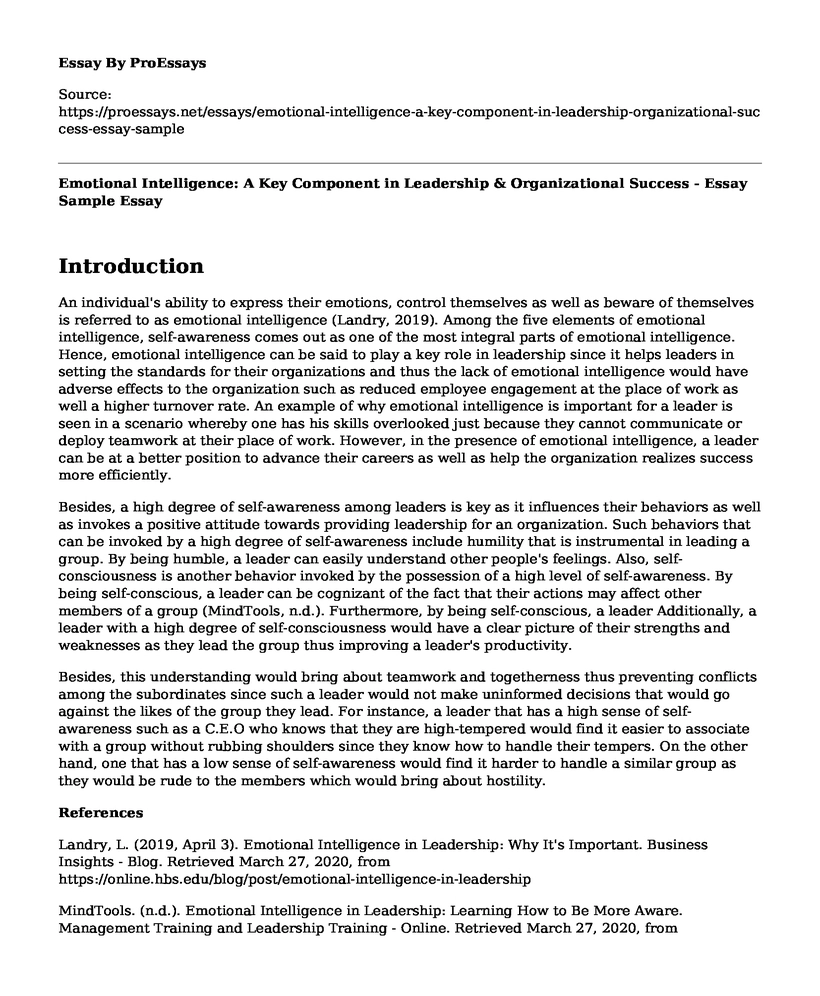Introduction
An individual's ability to express their emotions, control themselves as well as beware of themselves is referred to as emotional intelligence (Landry, 2019). Among the five elements of emotional intelligence, self-awareness comes out as one of the most integral parts of emotional intelligence. Hence, emotional intelligence can be said to play a key role in leadership since it helps leaders in setting the standards for their organizations and thus the lack of emotional intelligence would have adverse effects to the organization such as reduced employee engagement at the place of work as well a higher turnover rate. An example of why emotional intelligence is important for a leader is seen in a scenario whereby one has his skills overlooked just because they cannot communicate or deploy teamwork at their place of work. However, in the presence of emotional intelligence, a leader can be at a better position to advance their careers as well as help the organization realizes success more efficiently.
Besides, a high degree of self-awareness among leaders is key as it influences their behaviors as well as invokes a positive attitude towards providing leadership for an organization. Such behaviors that can be invoked by a high degree of self-awareness include humility that is instrumental in leading a group. By being humble, a leader can easily understand other people's feelings. Also, self-consciousness is another behavior invoked by the possession of a high level of self-awareness. By being self-conscious, a leader can be cognizant of the fact that their actions may affect other members of a group (MindTools, n.d.). Furthermore, by being self-conscious, a leader Additionally, a leader with a high degree of self-consciousness would have a clear picture of their strengths and weaknesses as they lead the group thus improving a leader's productivity.
Besides, this understanding would bring about teamwork and togetherness thus preventing conflicts among the subordinates since such a leader would not make uninformed decisions that would go against the likes of the group they lead. For instance, a leader that has a high sense of self-awareness such as a C.E.O who knows that they are high-tempered would find it easier to associate with a group without rubbing shoulders since they know how to handle their tempers. On the other hand, one that has a low sense of self-awareness would find it harder to handle a similar group as they would be rude to the members which would bring about hostility.
References
Landry, L. (2019, April 3). Emotional Intelligence in Leadership: Why It's Important. Business Insights - Blog. Retrieved March 27, 2020, from https://online.hbs.edu/blog/post/emotional-intelligence-in-leadership
MindTools. (n.d.). Emotional Intelligence in Leadership: Learning How to Be More Aware. Management Training and Leadership Training - Online. Retrieved March 27, 2020, from https://www.mindtools.com/pages/article/newLDR_45.htm
Cite this page
Emotional Intelligence: A Key Component in Leadership & Organizational Success - Essay Sample. (2023, May 03). Retrieved from https://proessays.net/essays/emotional-intelligence-a-key-component-in-leadership-organizational-success-essay-sample
If you are the original author of this essay and no longer wish to have it published on the ProEssays website, please click below to request its removal:
- Rational Decision-Making Model for Businesses Essay Example
- Essay Sample on Leadership in Hydro Generation
- Unlock Creativity, Leadership and Innovation - Paper Example
- Paper Example on Natural Disasters: Challenges in Risk Management Despite Technological Advancement
- Essay Example on Team Building: Essential for Healthcare Professionals
- Essay Example on Organizational Ethics: Building an Ethical Culture
- Essay Example on Project Management: Techniques to Plan, Estimate, and Control







